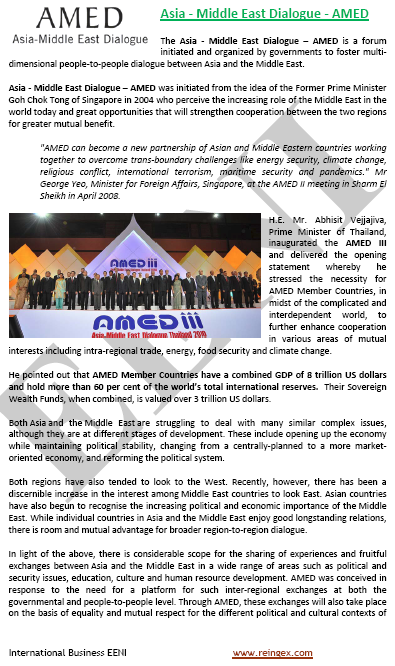
Asia-Middle East Dialogue (AMED) Arabia, China
Arab League-ASEAN (AMED) foster Asia-Middle East dialogue
- Introduction to the Asia-Middle East Dialogue (AMED)
- Principles and Objectives of the Asia-Middle East Dialogue
- AMED Working Groups
- Asia-Middle East Dialogue III Meeting
Sample - Asia-Middle East Dialogue (AMED)

The objectives of the subject “Asia-Middle East Dialogue (AMED)” are the following:
- To understand the purposes of the Asia-Middle East Dialogue
- To evaluate the role of the AMED working groups
- To analyze the economic profile of the member countries of the Asia-Middle East Dialogue

The Subject “Asia-Middle East Dialogue (AMED)” belongs to the following Online Programs taught by EENI Global Business School:
Doctorate: Islamic Business, Ethics, Religion & Business.
Masters: International Business.
Courses: Islam & Business, International Relations of Africa.

Why study “Islam and Business”?.
Languages:  or
or  Diálogo Asia-Oriente Medio(AMED)
Diálogo Asia-Oriente Medio(AMED)  Dialogue Asie - Moyen-Orient (AMED)
Dialogue Asie - Moyen-Orient (AMED)  Diálogo Ásia-Medio Oriente (AMED).
Diálogo Ásia-Medio Oriente (AMED).

The Asia-Middle East Dialogue is a forum created by the governments to promote a multi-dimensional people-to-people dialogue between Asia and the Middle East countries.
The members countries of the Asia-Middle East Dialogue (AMED) are Afghanistan, Algeria, Bahrain, Bangladesh, Bhutan, Brunei, Cambodia, Comoros, Djibouti, Egypt, India, Indonesia, Iran, Iraq, Japan, Jordan, Kazakhstan, Kuwait, Kyrgyzstan, Laos, Lebanon, Libya, Malaysia, Maldives, Mauritania, Morocco, Myanmar, Nepal, Oman, Pakistan, Philippines, Qatar, Republic of Korea, Saudi Arabia, Singapore, Somalia, Sri Lanka, Sudan, Syria, Tajikistan, Thailand, Tunisia, Turkey, Turkmenistan, UAE, Uzbekistan, Vietnam and Yemen.
The member economies of the Asia-Middle East Dialogue (AMED) have a combined GDP of 8 trillion dollars and holds near 60% of the total reserves of the World.
The countries of the Asia-Middle East Dialogue has a competitive advantage to generate a sustainable economic growth and development.
The main objectives of Asia-Middle East Dialogue (AMED) are:
- To increase the understanding between Asia and the Middle East at a people-to-people level as well as governmental level
- To promote reciprocally the successful cooperation between Asia and the Middle East
- To develop the policy suggestions that can be considered by the participating governments on political, economic, and social topics and conceptualize initiatives to improve trade relations between Asia and the Middle East
AMED III was attended by Thirty-nine members of the Asia-Middle East Dialogue, seventeen of which were represented at a ministerial and deputy departmental level, and the rest of which were represented at a sub-ministerial level.
The Asia-Middle East Dialogue (AMED) belongs to
(c) EENI Global Business School (1995-2024)
We do not use cookies
Top of this page



